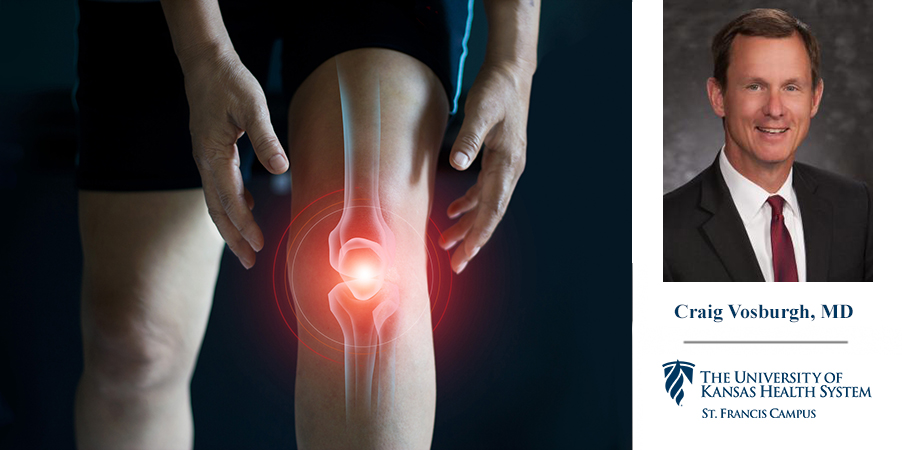8 Facts About Osteoarthritis and Mako SmartRobotics™ for Knee Replacement
Do you feel persistent pain and stiffness in one or both knees while walking, exercising or performing normal daily activities? If yes, you may have osteoarthritis and could be a candidate for knee replacement surgery.
Craig L. Vosburgh, MD, orthopedic surgeon at The University of Kansas Health System St. Francis Campus Orthopedics and Sports Medicine, answers questions about osteoarthritis and knee replacement surgery using Mako SmartRobotics™, an innovative solution for those suffering from arthritis of the knee.
What is osteoarthritis of the knee and what causes it?
Osteoarthritis is a degenerative process of the knee that results in a breakdown in the joint cartilage and underlying bone. Many factors can contribute to knee osteoarthritis:
- Genetics
- Age
- Leg Alignment
- Obesity
Arthritis can also develop as a result of trauma (knee joint fracture) or inflammatory disease (rheumatoid arthritis, psoriasis, etc.) The knee is one of the most commonly affected joints by all these types of arthritis.
What are the symptoms of osteoarthritis?
Pain and stiffness are the main 2 symptoms related to knee arthritis. Other difficulties related to osteoarthritis include:
- Loss of motion
- Limited ability to walk
- Recurrent joint swelling
- Knee “giving way”
- Leg deformity
Total knee replacement is a common treatment for end stage knee arthritis when the disease has progressed and more conservative measures, such as a brace, exercise, physical therapy or local injections are no longer effective.
What is Mako SmartRobotics™ for knee replacement?
Mako SmartRobotics™ is a robotic technology developed to assist with planning the knee surgery and allowing the surgeon to make accurate bony resections and placement of the knee implants.
How does it work?
In addition to routine X-rays, the patient undergoes a CT scan of the surgical leg prior to the surgery. The CT data can then be used to produce multiple 3D images of the knee with and without the superimposed implants. At the time of surgery, the leg and knee anatomy is then mapped out and real-time images of the joint are produced. These images can be rotated to allow the surgeon to not only select the appropriate bony cuts, but to also better anticipate how the surrounding soft tissues (ligaments) will be balanced. The bones are then cut in a very precise manner using a surgeon-guided robotic arm.
What are the advantages/benefits of using Mako?
The use of the Mako has consistently resulted in knee replacements being more accurately aligned and balanced. By improving the implant’s placement, better results (i.e. less pain and stiffness) and improved joint longevity routinely follow.
If a patient has retained orthopedic hardware in the surgical leg, Mako permits uncomplicated total knee replacement without need to remove the existing hardware.
Who is a good candidate for Mako robotic surgery?
With few exceptions, any patient who is a candidate for total knee replacement is a candidate for a Mako knee.
What is the expected recovery like?
The first few weeks after any total knee replacement require hard work by the patient to assure an optimal outcome. Outpatient physical therapy is often beneficial for at least 3-6 weeks following surgery. Life can start to approach normally after two months, but it usually takes longer to regain endurance and energy. Knee improvement routinely continues for at least 12 months.
How soon after surgery will I be able to return to normal daily activities?
Patients are routinely walking on the day of surgery and will be able to navigate stairs before returning home. It is expected that the total knee patient will be able to independently get in and out of bed, get dressed and use the toilet at the time of discharge. Most patients are able to drive within two weeks.
Dr. Vosburgh and the Orthopedics and Sports Medicine team at St. Francis Campus use advanced techniques and technology to treat a wide range of orthopedic conditions. To learn more about osteoarthritis, Mako SmartRobotics™, or our orthopedic and sports medicine services, visit our web page or call us at 785-233-7491.




